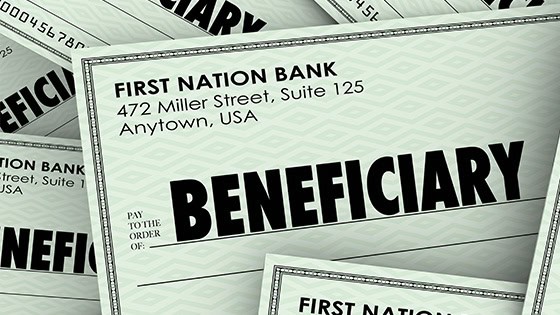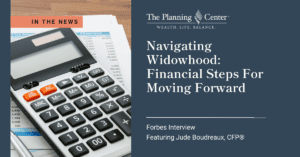
By Michelle Maton, Senior Financial Planner, CFP®, EA, CeFT®
It’s always difficult to lose a loved one. When that loss is accompanied by a large inheritance, the intersection of money, death, and family relationships can be daunting. Given how few people are prepared to deal with the emotional challenges associated with money, it’s not surprising that 90% of inherited wealth is gone by the third generation.
Financial Transitions Planning was created to fill a gap in the world of financial services. In addition to providing traditional financial planning services, advisors with this certification help people identify and work through the struggles that cause problems during major life transitions, such as receiving a large inheritance.
Transitions don’t have to be scary or overwhelming. A planner who is certified in financial transitions can guide you through the process of inheriting wealth and help you become a good steward of your new resources. Here is some of the advice I give clients after they receive an inheritance.
1. Create a Decision-Free Zone
A common impulse when dealing with a loss is to keep busy, and for a new heir, that could translate into trying to get lots of things done quickly. But when you’re dealing with the trauma of grief, it’s not a good time to make decisions related to your inheritance. Research shows that grief interferes with the part of our brain that controls executive functions, which we need to think, make choices, and plan for the future. Until you’ve processed the grief, you should minimize decision-making in general, and avoid any decisions that could have a major impact on your current or future life, such as selling your home or quitting your job.
Instead, work with your advisor to prioritize those items that require action and those that can wait. You’ll find many decisions are not urgent, which vastly reduces the burden of decision-making. I call this creating a decision-free zone. It’s a way of protecting yourself from choices you might later regret while you deal with the trauma of loss.
2. Manage Others’ Expectations
While you’re in the decision-free zone, be sure to let the people around you know. That will reduce any pressure from outside sources who may want to encourage you to take actions
or make decisions you aren’t ready for yet. It might be a well-intended family member who is convinced you should pay off your mortgage, or a friend who doesn’t want you to miss out on a good investment, or a realtor who’s lobbying you to sell your house. You don’t need to engage on the merits of the ideas, simply state you’re not making any decisions right now. If it helps, you can blame your financial advisor.
3. Separate Money from Grief
A question I often ask heirs is, “Whose Money Is it?” Some people get very locked into the idea that this is my father’s, mother’s, or aunt’s money, rather than seeing it as their own. When this happens, people mentally put the money into a separate bucket and treat it as if it can only be used for certain things because of where it came from. Sometimes feelings of loss are compounded by feelings of guilt for having inherited the money, which leads some people to feel they shouldn’t spend it at all.
From a planning perspective, the money from an inheritance, is just money. It doesn’t have an attachment to anything or anyone. To move forward, it’s important to be able to separate the money from the grief. If you are struggling to do that, my best advice is to work with your financial advisor to make sure the money is safe, then give yourself the time, and seek the emotional support you need to process your grief.
4. Take Your Time
The amount of time it takes to recover from a loss is different for everyone. You don’t need to subscribe to someone else’s timeline for when you should be “over it.” Be generous with yourself and recognize that progress will not be a straight line. You may have a period when you feel great, and then experience a setback. This is normal.
Gradually, the time will come when instead of looking to the past, you are excited about the future and the possibilities it holds. When you can direct your energy towards building a new life, it’s a good time to make decisions about your inheritance.
Work with a CeFT®
To learn more about Certified Financial Transitionist® (CeFT®) visit the Sudden Money Institute’s website, or contact The Planning Center. We have advisors with the training and tools to help clients navigate major transitions and help them manage their money intentionally and responsibly.





